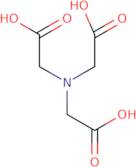Nitrilotriacetic acid
CAS: 139-13-9
Ref. 3D-FN02745
| 1kg | Descontinuado | ||
| 2kg | Descontinuado | ||
| 100g | Descontinuado | ||
| 250g | Descontinuado | ||
| 500g | Descontinuado | ||
| 0.1kg | Descontinuado | ||
| 0.5kg | Descontinuado | ||
| 1000g | Descontinuado | ||
| 2000g | Descontinuado | ||
| 0.25kg | Descontinuado |
Informação sobre produto
- Tris(carboxymethyl)amineN,N-Bis(carboxymethyl)glycineNTA
- (Bis-carboxymethyl-amino)-acetic acid
- 2-[Bis(carboxymethyl)amino]acetic acid
- 412: PN: WO2007070372 PAGE: 72 claimed protein
- Acetic acid, nitrilotri-
- Acide nitrilotriacetique
- Acido Nitrilotriacetico
- Ai3-52483
- Alpha,Alpha',Alpha''-Trimethylaminetricarboxylic Acid
- Aminotriacetic Acid
- Ver mais sinónimos
- Chel 300
- Chel300
- Chelest NT
- Complexon I
- Complexoni
- Dissolvine A
- Dissolvine AZ
- Glycine, N,N-bis(carboxymethyl)-
- Glycine,N,N-bis(carboxyme
- Glycine-N,N-diacetic acid
- Hampshire Nta Acid
- Hampshirentaacid
- Komplexoni
- Kyselinanitrilotrioctova
- Kyselinanitrilotrioctova(Czech)
- N 0098
- N,N-bis(carboxymethyl)glycine
- NTA
- NTA N,N-Bis(carboxymethyl)glycine
- Nitrilo triacetic acid
- Nitrilo-2,2',2''-Triacetic Acid
- Nitrilo-2,2′,2′′-triacetic acid
- Nitrilo-N,N,N-triacetic acid
- Nitrilotriessigsaeure
- Nitrilotriessigsaure
- Nitrilotris(methylenecarboxylic acid)
- Nsc 2121
- Titriplex I
- Tri(Carboxymethyl)Amine
- Tricollamic acid
- Triglycine
- Triglycollamic Acid
- Trilon AS
- Trilone A
- Trimethylamine-α,α',α"-tricarboxylic acid
- Tris(carboxymethyl)amine
- Tris(hydroxycarbonylmethyl)amine
- Versene Nta Acid
- α,α',α''-Trimethylaminetricarboxylic acid
Nitrilotriacetic acid (NTA) is a chelating agent that binds to iron and prevents its absorption. It is used as a water treatment agent for the removal of heavy metals from wastewater and to remove calcium, magnesium, and other metal ions from drinking water. Nitrilotriacetic acid has been shown to inhibit the activity of enzymes involved in the synthesis of proteins, such as surfactant sodium dodecyl sulfate reductase and dextran sulfate reductase. NTA also inhibits the growth of bacteria by altering their membrane integrity, which may be due to its ability to form intermolecular hydrogen bonds.





